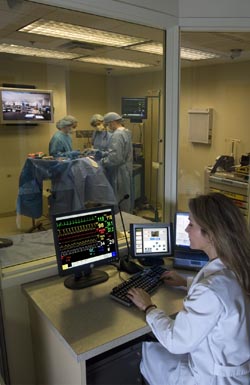Integrators who can establish a broad and integrated communication, entertainment, nurse-call, and security solution will find a unique niche in the nursing facilities of the future. Student nurses at Virginia Commonwealth University's Anesthesia Simulation Center are learning via a Crestron touchpanel with vital statistics superimposed over video in real time.The healthcare market needs good integrators. Your company may or may not have the tools or the chops to approach this market, but it continues to expand, and it's getting more complicated. There are a few things you should know before you decide to market to the healthcare industry.
The Nursing Home Market
What ever happened to the great boom in the nursing home and extended care market that was predicted 10 to 15 years ago? With the rapidly aging population in the U.S. it was predicted that huge growth would take place in facility construction. Now as we age, more of us as staying healthy longer, and when health fades we want to stay at home.
The new trend in construction is campuses made up of three levels of care all integrated into a single solution. Level one covers an entry level that might include villas for independent retirement style living. When constructed on the same campus as higher-level care facilities, residents have direct and fast access to services if they need them. Otherwise, they live their daily lives independent from constant care and supervision. Level two includes assisted living that might resemble apartment style living, but with a more intense level of service and care. It might include meals, regular visits by in-house healthcare professionals, welfare checks, and limited independent mobility. Level three will include construction of a skilled nursing center where physical and mental health concerns require constant attention and care. This part of the facility will resemble a conventional nursing home with a dedicated section secured for dementia patients who may wander, becoming a threat to themselves and sometimes others.
Integrators who can establish a broad and integrated communication, entertainment, nurse-call, and security solution will find a unique niche in the nursing facilities of the future. Increasing regulation of skilled nursing facilities brought on by questionable care practices and poor patient supervision present an opportunity to integrators, who can supply nurse call systems integrated with patient information systems and activity tracking. These systems can increase productivity and accountability, allowing the review of patient-care history and response by management and relatives of the patients.
The Hospital Market
This market is not for the faint of heart. Reviewing changes in this industry over the last 10 years will make your head spin. First, there have been the roll-ups as major healthcare networks have and continue to buy hospitals that sometimes change hands every couple of years. Staffing shortages have plagued this industry for decades, and the situation is only getting worse. And then there is the health insurance industry that makes getting paid for care into a game of Russian roulette. Add to all of this the significant advances in medicine over the last 20 years that continue to cause an escalation in the cost of providing healthcare, and you have what on the surface looks like a pretty messy industry. But, for integrators with experience and business savvy, the hospital market provides significant opportunities and rewards.
Learning to navigate the world of the GPO (group purchase organization) is key to selling to hospitals. Some GPOs are owned by national hospital networks, while others are independent. Even though a hospital might belong to a GPO, that is no guarantee they will purchase from them. When they insist on using the GPO, you will need to represent vendors who negotiate onto these contracts and then you need to learn how to turn low pre-negotiated margins on products into profitable contracts through labor and other services.
Learning to market and sell to the right people can be challenging. In the past many technology decisions in hospitals were made by facility managers. Today those same decisions are more likely to be influenced, if not out right made by nursing or IT administrators. Navigating this maze of influencers takes skill and strong relationships.
Additionally, past performance can be the best marketing tool. Hospital professionals are used to being disappointed by technology and while price will always be important, performance history will likely always trump price in this market.
What Will Be Needed
Decisions on technology spending will be driven by the need to create efficiencies with staff and processes that save steps, allow managers to do more with less, and generate more revenue. One example might be helping manage bed occupancy. Nurse call systems can help track the status of rooms and beds while communicating with housekeeping, nursing managers, and admitting.
Systems that integrate nursing functions and enhanced communication with other hospital departments such as surgery, labs, and pharmacies are desirable and require convergence and integration skills. Your sales and engineering staff will need an intimate knowledge of the all the departments and their role in the hospital in order to provide and install meaningful and comprehensive systems and solutions.
Wireless integration and wireless technologies are making hospital solutions more portable and comprehensive. Integrators working in the hospital of the future are going to become IT experts with excellent skills in wireless technologies. Phones and pagers are only the beginning as wireless products are perfected and reliability increases.
And don't forget security. Access control systems integrated with comprehensive camera surveillance products are an absolute necessity in today's modern hospital. These systems are large and completely integrated with IP networks and soon to come to the healthcare industry will be the application of video analytics and advanced surveillance systems that will do most of the thinking and alert to threats before they occur.
